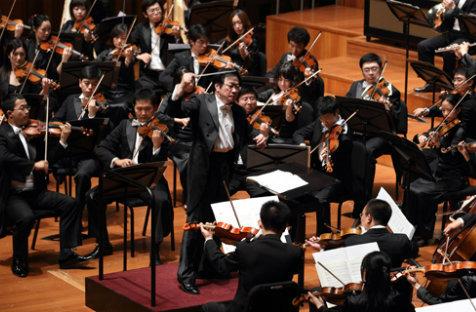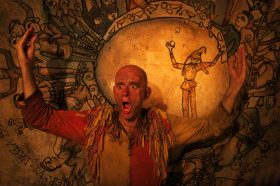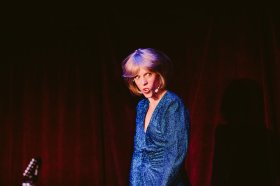There was an awkward audience in the Sydney Opera House Concert Hall the evening the NCPA Orchestra of China came to town, awkward in the way that first-time audiences, who don’t know the ins and outs of concert etiquette, often are. The first encore, given after the violin concerto in the first half, had to be dragged out of the audience by the musicians stamping on the floor and waving their bows around in encouragement. It wasn’t that the audience wasn’t enthusiastic about music being played, or that they didn’t enjoy it (they certainly had a great time), but they seemed to interpret the conductor walking off stage as a sign to stop applauding. (Which, when one thinks about it from a fresh perspective, is probably the logical thing to do.)
The National Centre for the Performing Arts’ Orchestra was formed in March 2010, and has come into its own already. As such it was quite a fitting way to celebrate the 40th anniversary of diplomatic relations between Australia and China. Maestro Chen Zuohuang conducted the evening, which began with Li Huanzhi’s Overture to Spring Festival, a delightfully quick five-minute overture that put many of the Sydney Symphony’s longer efforts to shame. What Chen Zuhohuang managed to get out of the orchestra was a rather pleasant balance in the tempo, sidestepping any of the lagging problems that often plague interpretations of such pieces (one starts out loud and brash, but then gets lost and muddled in the middle sections).
Next came He Zhanhao and Chen Gang’s The Butterfly Lovers Violin Concerto, but not before the entire first violin section moved their own chairs backwards to make room for violinist Ning Feng. There was something rather uplifting about seeing the seats being organised by members from the orchestra, as opposed to having half the musicians file off the stage, then waiting for the stagehands to amble on and painfully, one by one, reposition each chair and music stand. Whether it’s a Chinese tradition, or just a lack of staff, I’ve no idea, but one wishes some Australian orchestras were more efficient.
Ning Feng has a subdued charisma when he pays his violin – he’s a showman who plays for himself alone. The Butterfly Lovers was written in 1959, and is one of the most ‘famous works of Chinese music, and certainly one of the most famous outside of China’. Not famous enough, however, for this critic to have heard it before, but one was pleasantly surprised by the sheer joie de vivre of the piece, like a combination between Ross Edwards’ Maninyas and Ralph Vaughn Williams’ The Lark Ascending. This was a piece to be savoured, and the conductor once again showed the same careful attention to tempo that strengthened the entire structure.
After the interval came Dvorak’s Symphony No. 9 in E minor ‘From the New World’, which wasn’t the best interpretation that one has ever heard, but was certainly thoroughly enjoyable. The real weakness of the piece was the third movement, which didn’t feel like it knew where it was going, but the other three movements, especially the second and fourth, were resounding.
All in all, a wonderful concert, which, while not having the floral arrangements scattered about the Concert Hall to signify a special occasion (such as the Vienna Philharmonic Orchestra, for instance), proved itself special nonetheless.
Rating: 4 ½ stars out of 5
NCPA Orchestra of China
Chen Zuohuan (conductor), Ning Feng (violin)
LI Huanzhi – Overture to Spring Festival
HE Zhanhao, CHEN Gang – The Butterfly Lovers Violin Concerto
Antonin Dvorak – Symphony No. 9 in E minor “From the New World”, Op. 95
Concert Hall, Sydney Opera House
6 November





